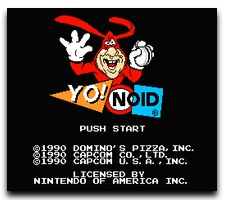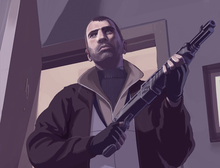Yo! Noid was a commercial opportunity for Domino’s Pizza developed by Capcom. This retro style game revolved around Domino’s Pizza claymation style mascot, the Noid, as he adventures through fourteen stages of side scrolling action.
 The game sound was much like any other 8-bit action platformer. It reminded me of the original Teenage Mutant Ninja Turtles for the Nintendo Entertainment System, not the cool arcade one. Minus the turtles, Yo! Noid is a battle against Mr. Green, the Noids evil duplicate, a concept used in so many games; remember Shadow Link?
The game sound was much like any other 8-bit action platformer. It reminded me of the original Teenage Mutant Ninja Turtles for the Nintendo Entertainment System, not the cool arcade one. Minus the turtles, Yo! Noid is a battle against Mr. Green, the Noids evil duplicate, a concept used in so many games; remember Shadow Link?
Unlike Link, Noid lost a life when he hit an enemy similar to the Super Mario Bros. style platformer but with a Yo Yo weapon. You could also gather smart-bomb type scrolls to clear the screen of all enemies, another classic side scroller arcade recipe. Yo! Noid brought nothing to the table in terms of uniqueness and relied on the standard recipe of side scrolling conflict.
This retro game may be one of the first true “total conversion mods.” Later we’d see Counter Strike born out of the Half-Life engine and way before that, Noah’s Ark 3D built out of the Wolfenstein 3D engine. Yo! Noid was a re-creation of the game Kamen no Ninja Hanamaru. Oddly enough, Yo! Noid was probably more well known than its forefather game because Capcom didn’t release Kamen no Ninja Hanamaru in the United States. Instead, we got Yo! Noid and a $1.00 off coupon on the back of the manual so we can get ourselives some Domino’s Pizza.
Although a few of us may recall Yo! Noid from our childhood, the title really didn’t create any huge waves in the game industry. Yo! Noid did show developers that a brand named product could be used as a marketing and brand awareness strategy, something we’d later see Burger King try on the Xbox 360 and find some success.
Can you tell the difference between Yo! Noid and Kamen no Ninja Hanamaru?

